Commander (2019 Edition) Release Notes
Compiled by Eli Shiffrin, with contributions from Laurie Cheers, Carsten Haese, Nathan Long, and Thijs van Ommen.
Document last modified July 3, 2019.
DOC Download Links:
English | Español | Français | Deutsch
Italiano | 日本語 | Português | русский язык
The Release Notes include information concerning the release of a new Magic: The Gathering set, as well as a collection of clarifications and rulings involving that set's cards. It's intended to make playing with the new cards more fun by clearing up the common misconceptions and confusion inevitably caused by new mechanics and interactions. As future sets are released, updates to the Magic rules may cause some of this information to become outdated. If you can't find the answer you're looking for here, please contact us at Wizards.CustHelp.com.
The "General Notes" section includes release information and explains the mechanics and concepts in the set.
The "Card-Specific Notes" section contains answers to the most important, most common, and most confusing questions players might ask about cards in the set. Items in the "Card-Specific Notes" section include full card text for your reference. Not all cards in the set are listed.
GENERAL NOTES
Release Information
The Magic: The Gathering—Commander (2019 Edition) release consists of four different game packs. Each game pack contains a deck with 100 cards plus an oversized foil commander card. The four decks are "Faceless Menace," "Merciless Rage," "Mystic Intellect," and "Primal Genesis."
Release date: August 23, 2019
Go to Locator.Wizards.com to find an event or store near you.
New Cards and Format Legality
There are fifty-nine cards within the Magic: The Gathering—Commander (2019 Edition) decks that are completely new to the Magic game. These cards are legal for play in the Commander, Vintage, and Legacy formats. They aren't legal for play in the Standard or Modern formats.
The other cards in this release are legal for play in any format that already allows those cards. That is, appearing in this release doesn't change a card's legality in any format.
For more information about Magic formats, please visit Magic.Wizards.com/Rules. For information about the format legality of a specific card, please visit Gatherer.Wizards.com, search for the card, and check the "Sets & Legality" tab.
What Is Commander?
Created and popularized by fans, Commander is a casual format in which each player's deck is led by that player's commander—traditionally a legendary creature, although a few planeswalker cards outside of this product state that they can also be a deck's commander. It's usually played in casual Free-for-All multiplayer games, although two-player games are also popular. Each player starts at 40 life. Each deck contains exactly 100 cards, including its commander. Commander is also a "singleton" format: other than basic lands, each card must have a different English name.
A recommended banned list for the Commander format is maintained by the rules committee at MTGCommander.net, not by Wizards of the Coast.
Using Your Commander
The legendary card chosen as your deck's commander plays a prominent role in games, often appearing on the battlefield multiple times.
- For ease of reading, this document will generally assume that your commander is a creature card, but a very small number of legendary planeswalker cards in other products have the text "[This card] can be your commander." The same rules referenced here apply to those cards if one of them is your commander. A legendary noncreature card can't be chosen as your deck's commander unless it has that ability.
- Your commander begins the game in a separate game area called the command zone. The other 99 cards are shuffled and become your library.
- While in the command zone, your commander's abilities won't affect the game unless those abilities specifically say they do.
- You may cast your commander from the command zone. Each time you do, it costs 2 more to cast for each time you've previously cast it from the command zone during the game. This additional cost is informally known as the "commander tax."
- If you're casting your commander from the command zone for an alternative cost or "without paying its mana cost," the commander tax applies in addition to that cost.
- If your commander would be exiled or put into your hand, graveyard, or library from anywhere, you may choose to put it into the command zone instead. If it would have died, it doesn't die—abilities that trigger whenever a creature die won't trigger.
Your commander's color identity determines the other cards that can be in your deck. A card's color identity includes its color, as defined by its mana cost or color indicator, plus the colors of any colored mana symbols in the rules text.
- Color identity is established before the game begins and doesn't change during the game, even if your commander becomes a different color.
- A land with a basic land type can't be included in your deck if that basic land type's intrinsic mana ability generates a color of mana outside of your color identity.
- Color words in a card's text don't add to a card's color identity.
In addition to the normal rules regarding winning and losing the game, the Commander format has one other rule: a player who has been dealt 21 or more combat damage by the same commander over the course of the game loses the game.
- Players should keep track of combat damage dealt to them by each commander over the course of the game.
- This rule includes a player's own commander, which can deal combat damage to its owner if the commander is controlled by another player or if its combat damage gets redirected to that player.
Leaving the Game
Unlike two-player games, multiplayer games can continue after a player loses and leaves the game.
- When a player leaves the game, all permanents, spells, and other cards owned by that player also leave the game.
- If that player controlled any abilities or copies of spells that were waiting to resolve, they cease to exist.
- If that player controlled any permanents owned by another player, the effects that gave control of them to the player who left end. If this doesn't give control of them to a different player (most likely because those permanents entered the battlefield under the control of the player who left), they're exiled.
Oversized Commanders
Each Magic: The Gathering—Commander (2019 Edition) deck comes with an oversized premium card that corresponds to one possible commander of that deck. This card is for fun only and isn't required for Commander gameplay.
- You must have the traditional Magic card version of your commander, even if you use the oversized card.
- As long as your commander is in a public zone, such as the command zone or the battlefield, you may substitute the oversized card for the traditional Magic card.
- If your commander is in a hidden zone, such as your library or your hand, use the traditional Magic card.
Returning Mechanics
Each mechanic that appears in this release has appeared in previous sets. Of those mechanics, four mechanics take the spotlight, one in each Magic: The Gathering—Commander (2019 Edition) deck.
The rules for these mechanics haven't changed from their most recent previous appearance.
Returning Keyword Ability: Flashback
The "Mystic Intellect" deck is perfect for those who love spellcasting, and what's better than a spell you can cast more than once? Your spells with the flashback keyword will do double duty, coming back for a second use.
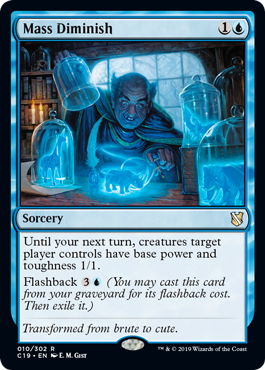
Mass Diminish
1U
Sorcery
Until your next turn, creatures target player controls have base power and toughness 1/1.
Flashback 3U (You may cast this card from your graveyard for its flashback cost. Then exile it.)
- You must still follow any timing restrictions and permissions, including those based on the card's type. For instance, you can only cast a sorcery using flashback when you could normally cast a sorcery.
- To determine the total cost of a spell, start with the mana cost or alternative cost (such as a flashback cost) you're paying, add any cost increases, then apply any cost reductions. The converted mana cost of the spell remains unchanged, no matter what the total cost to cast it was.
- A spell cast using flashback will always be exiled afterward, whether it resolves, is countered, or leaves the stack in some other way.
- You can cast a spell using flashback even if it was somehow put into your graveyard without having been cast.
Returning Keyword Ability: Madness
If you want to use cards in your hand as a resource rather than cast them, you'll be discarding them a lot. The "Merciless Rage" deck is set up to take full advantage of this, and the madness keyword lets you cast some of those cards after you discard them.
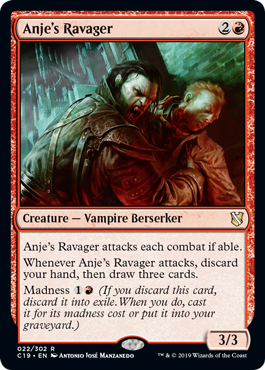
Anje's Ravager
2R
Creature — Vampire Berserker
3/3
Anje's Ravager attacks each combat if able.
Whenever Anje's Ravager attacks, discard your hand, then draw three cards.
Madness 1R (If you discard this card, discard it into exile. When you do, cast it for its madness cost or put it into your graveyard.)
- Cards are discarded in a Magic game only from a player's hand. Effects that put cards from a player's library into that player's graveyard do not cause those cards to be discarded.
- A spell cast for its madness cost is put onto the stack like any other spell. It can be countered, copied, and so on. As it resolves, it's put onto the battlefield if it's a permanent card or into its owner's graveyard if it's an instant or sorcery card.
- Casting a spell with madness ignores the timing rules based on the card's card type. For example, you can cast a sorcery with madness if you discard it on an opponent's turn.
- To determine the total cost of a spell, start with the mana cost or alternative cost (such as a madness cost) you're paying, add any cost increases, then apply any cost reductions. The converted mana cost of the spell remains unchanged, no matter what the total cost to cast it was.
- Madness works independently of why you're discarding the card. You could discard it to pay a cost, because a spell or ability tells you to, or even because you have too many cards in your hand during your cleanup step. You can't discard a card with madness just because you want to, though.
- When you cast a card with madness, it was still discarded. If it was discarded to pay a cost, that cost is still paid. Abilities that trigger when a card is discarded will still trigger.
- If you choose not to cast a card with madness when the madness triggered ability resolves, it's put into your graveyard. You don't get another chance to cast it later.
- If you discard a card with madness to pay the cost of a spell or activated ability, that card's madness trigger (and the spell that card becomes, if you choose to cast it) will resolve before the spell or ability the discard paid for.
- If you discard a card with madness while a spell or ability is resolving, it moves immediately to exile. Continue resolving that spell or ability—the card is not in your graveyard at this time. Its madness trigger will be placed onto the stack once that spell or ability has completely resolved.
Returning Keyword Action: Populate
Perhaps you would rather win with a lot of creatures instead of a lot of spells? The "Primal Genesis" deck lets you swarm the battlefield with tokens, and the populate keyword gives you copies of the best tokens you have.
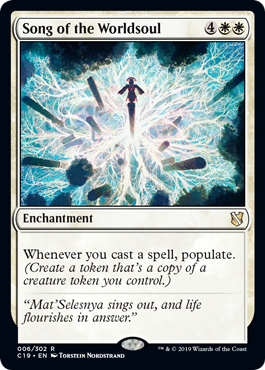
Song of the Worldsoul
4WW
Enchantment
Whenever you cast a spell, populate. (Create a token that's a copy of a creature token you control.)
- Once you begin to resolve a spell or ability that populates, no player may take other actions until you're done. Notably, opponents can't stop you from copying the creature token you've chosen by removing that creature token.
- If you choose to copy a creature token that's a copy of another creature, the new creature token will copy the characteristics of whatever the original token is copying.
- The new creature token copies the characteristics of the original token as stated by the effect that created the original token. If the effect also created a delayed triggered ability affecting the token (such as "Exile it at the beginning of the next end step"), that delayed triggered ability won't affect the copy you populate.
- The new token doesn't copy whether the original token is tapped or untapped, whether it has any counters on it or Auras and Equipment attached to it, or any noncopy effects that have changed its power, toughness, color, and so on.
- If you control no creature tokens when you populate, nothing will happen.
Returning Mechanic: Face-Down Cards
Lastly, we have the "Faceless Menace" deck. What is its keyword? We'll have to wait until it's turned face up to find out, because it's all about face-down cards! Your cards will end up face down thanks to the morph, megamorph, and manifest keywords.
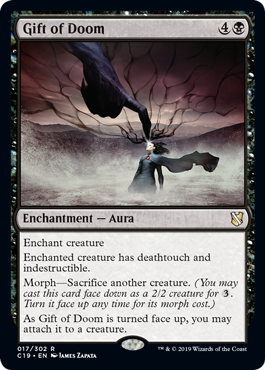
Gift of Doom
4B
Enchantment — Aura
Enchant creature
Enchanted creature has deathtouch and indestructible.
Morph—Sacrifice another creature. (You may cast this card face down as a 2/2 creature for 3. Turn it face up any time for its morph cost.)
As Gift of Doom is turned face up, you may attach it to a creature.
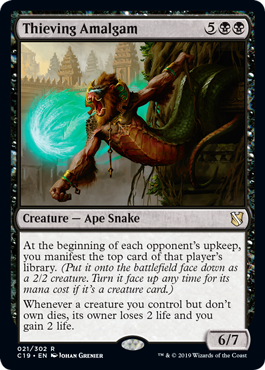
Thieving Amalgam
5BB
Creature — Ape Snake
6/7
At the beginning of each opponent's upkeep, you manifest the top card of that player's library. (Put it onto the battlefield face down as a 2/2 creature. Turn it face up any time for its mana cost if it's a creature card.)
Whenever a creature you control but don't own dies, its owner loses 2 life and you gain 2 life.
- Megamorph is a variant of morph. A megamorph ability is a morph ability, and a megamorph cost is a morph cost. All rules and rulings for morph apply to megamorph, except that after paying a megamorph cost to turn a creature face up, you put a +1/+1 counter on it as it turns face up.
- To cast a spell with a morph ability, you turn it face down before determining whether it's legal to cast. The face-down spell (and the permanent it becomes) is a 2/2 creature with no name, mana cost, creature types, or abilities. It's colorless and has a converted mana cost of 0, and the cost to cast the spell is 3. Other effects that apply to the spell or permanent can still grant or change any of these characteristics.
- To manifest a card is to simply put it onto the battlefield face down from where it is. You don't reveal what it is as you do so. It becomes a 2/2 creature with no name, mana cost, creature types, or abilities. It's colorless and has a converted mana cost of 0.
- At any time, you can look at a face-down permanent you control. You can't look at face-down permanents you don't control unless an effect instructs you to do so.
- The face-down characteristics of a permanent are copiable values. If another object becomes a copy of a face-down creature or if a token is created that's a copy of a face-down creature, that new object is a 2/2 colorless face-up creature with no abilities.
- Because face-down creatures don't have a name, they can't have the same name as any other creature or share any creature types with any other creature, even another face-down creature.
- Any time you have priority, you may turn a face-down creature face up by revealing that it's a manifested creature card (ignoring any type-changing effects that might be applying to it) or by revealing its morph cost. You pay the manifested creature's mana cost or the morph cost. This is a special action. It doesn't use the stack and can't be responded to.
- If a card with a morph ability is manifested, you can turn it face up by paying its morph cost or, if it's a creature card, by paying its mana cost.
- If the morph ability whose cost you pay is a megamorph ability, you put a +1/+1 counter on the creature as you turn it face up. No player may take actions once the card is face up before it has a +1/+1 counter.
- Because the permanent is on the battlefield both before and after it's turned face up, turning a permanent face up doesn't cause any enters-the-battlefield abilities to trigger.
- A permanent that turns face up or face down changes characteristics but is otherwise the same permanent. Spells and abilities that were targeting that permanent, as well as Auras and Equipment that were attached to the permanent, aren't affected.
- Turning a permanent face up or face down doesn't change whether that permanent is tapped or untapped.
- If a face-down permanent you control leaves the battlefield, you must reveal it. If a face-down spell you control leaves the stack other than by resolving, you must reveal it. You must also reveal all face-down spells and permanents you control if you leave the game or if the game ends. The game doesn't count them as being turned face up when you reveal them this way.
- You must ensure that your face-down spells and permanents can easily be differentiated from each other. You're not allowed to mix them up on the battlefield to confuse other players. The order they entered the battlefield should remain clear. Common methods for indicating this include using markers or dice, or simply placing them in order on the battlefield.
- There are no cards in this set that would turn a face-down manifested instant or sorcery card face up, but some older cards can try to do this. If something tries to turn a face-down instant or sorcery card on the battlefield face up, reveal that card to show all players it's an instant or sorcery card. The permanent remains on the battlefield face down. Abilities that trigger when a permanent turns face up won't trigger, because even though you revealed the card, it never turned face up.
- If an effect tries to return a face-down creature to the battlefield after it leaves (such Momentary Blink or Adarkar Valkyrie's delayed triggered ability), that effect returns the card face up. If it tries to put an instant or sorcery card onto the battlefield this way, that card remains in its current zone instead.
- Some previous Magic sets feature double-faced cards, which have a Magic card face on each side rather than a Magic card face on one side and a Magic card back on the other. If a double-faced card is manifested, it will be put onto the battlefield face down. While face down, it can't transform. If the front face of the card is a creature card, you can turn it face up by paying its mana cost. If you do, its front face will be up. Although a double-faced card can enter the battlefield face down, one already on the battlefield can't be turned face down.
CARD-SPECIFIC NOTES
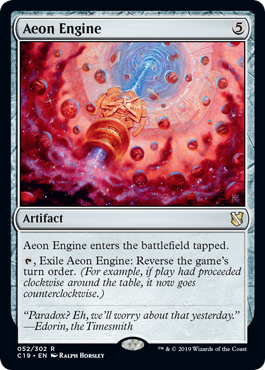
Aeon Engine
5
Artifact
Aeon Engine enters the battlefield tapped.
T, Exile Aeon Engine: Reverse the game's turn order. (For example, if play had proceeded clockwise around the table, it now goes counterclockwise.)
- This effect reverses the turn order for players established at the beginning of the game. While the order is reversed, anything that cares about this order (such as determining in what order choices are made) will use the new order.
- If the game's turn order is reversed again, it will return to the default order used at the beginning of the game.
- If the turn order is reversed during an extra turn, the next non-extra turn will be taken by the next player in turn order from the last player who took a non-extra turn. The order of any pending extra turns isn't affected.
- If the turn order is reversed during a two-player game, or during a multiplayer game that only has two players left, it has no noticeable effect on the game.
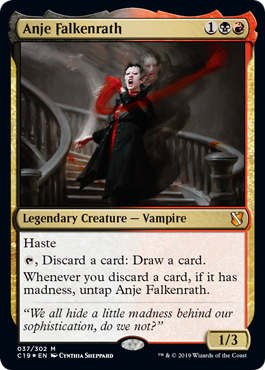
Anje Falkenrath
1BR
Legendary Creature — Vampire
1/3
Haste
T, Discard a card: Draw a card.
Whenever you discard a card, if it has madness, untap Anje Falkenrath.
- If you discard a card with madness to pay the cost of Anje's activated ability, you'll draw a card last. You may untap Anje before or after you choose whether to cast the discarded card, but not after you've chosen to cast it but before that spell resolves.

Anje's Ravager
2R
Creature — Vampire Berserker
3/3
Anje's Ravager attacks each combat if able.
Whenever Anje's Ravager attacks, discard your hand, then draw three cards.
Madness 1R (If you discard this card, discard it into exile. When you do, cast it for its madness cost or put it into your graveyard.)
- If Anje's Ravager can't attack for any reason (such as being tapped or having come under that player's control that turn), then it doesn't attack. If there's a cost associated with having it attack, its controller isn't forced to pay that cost, so it doesn't have to attack in that case either.
- You draw three cards while resolving the triggered ability, even if you discarded zero cards.
- If any of the cards you discard have madness, you'll choose whether to cast them after you've drawn three cards.
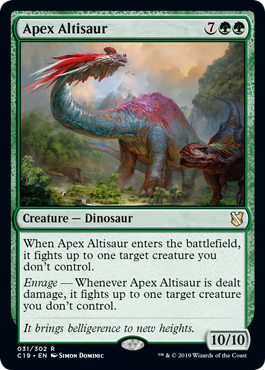
Apex Altisaur
7GG
Creature — Dinosaur
10/10
When Apex Altisaur enters the battlefield, it fights up to one target creature you don't control.
Enrage — Whenever Apex Altisaur is dealt damage, it fights up to one target creature you don't control.
- If Apex Altisaur fights a creature while either of its abilities is resolving, being dealt damage this way causes its second ability to trigger. It may fight several times in a row this way.
- If the target creature is an illegal target when Apex Altisaur's last ability tries to resolve, the ability doesn't resolve. If it's a legal target but Apex Altisaur is no longer on the battlefield when the ability resolves (perhaps because it has already died from picking too many fights) the target creature won't deal or be dealt damage.
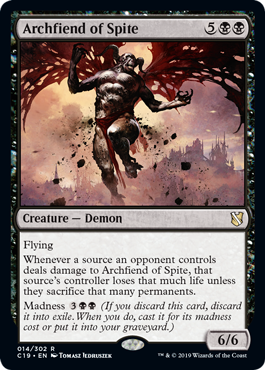
Archfiend of Spite
5BB
Creature — Demon
6/6
Flying
Whenever a source an opponent controls deals damage to Archfiend of Spite, that source's controller loses that much life unless they sacrifice that many permanents.
Madness 3BB (If you discard this card, discard it into exile. When you do, cast it for its madness cost or put it into your graveyard.)
- Archfiend of Spite's triggered ability will trigger even if it is dealt lethal damage. For example, if Archfiend of Spite blocks a 7/7 creature, its ability will trigger when combat damage is dealt and the attacking player will sacrifice seven permanents or lose 7 life.
- The source's controller must either sacrifice permanents or lose life. They can't choose to sacrifice some permanents and lose some life.
- If the player doesn't control enough permanents that they can sacrifice, they must lose life.
- The player may always choose not to sacrifice permanents, even if they will end up losing more life than they have or if an effect (such as that of Platinum Emperion) says that they can't lose life.
- The player who loses life or permanents is the player who controls the source as Archfiend of Spite's triggered ability resolves. In some rare cases, this may not be the same player who controlled the source as it dealt damage. If the source is no longer in the zone it was in as it dealt damage, the source's last known information is used to determine who controlled it.
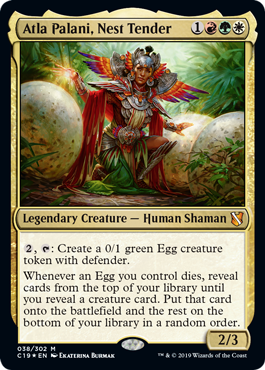
Atla Palani, Nest Tender
1RGW
Legendary Creature — Human Shaman
2/3
2, T: Create a 0/1 green Egg creature token with defender.
Whenever an Egg you control dies, reveal cards from the top of your library until you reveal a creature card. Put that card onto the battlefield and the rest on the bottom of your library in a random order.
- If Atla Palani dies at the same time as one or more Eggs you control, its last ability triggers for each of those Eggs.
- If there are no creature cards in your library as Atla Palani's last ability resolves, you reveal your library then put it back in a random order.
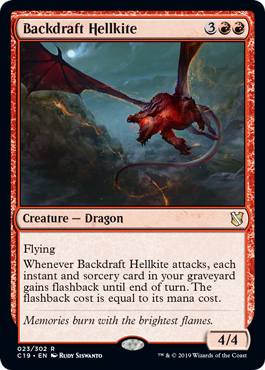
Backdraft Hellkite
3RR
Creature — Dragon
4/4
Flying
Whenever Backdraft Hellkite attacks, each instant and sorcery card in your graveyard gains flashback until end of turn. The flashback cost is equal to its mana cost.
- Only instant and sorcery cards in your graveyard when Backdraft Hellkite's triggered ability resolves will gain flashback. Instant and sorcery cards that are put into your graveyard later in the turn won't gain flashback.
- Once Backdraft Hellkite has attacked, its ability will resolve and grant the appropriate cards flashback even if Backdraft Hellkite leaves the battlefield before the ability resolves or after it resolves but before you cast the spells.
- If you cast an instant or sorcery with X in its mana cost this way, you still choose the value of X as part of casting the spell and pay that cost.
- If an instant or sorcery card in your graveyard already has flashback, you may use either flashback ability to cast it from your graveyard.
- You may pay any optional additional costs the spell has, such as kicker costs. You must pay any mandatory additional costs the spell has, such as that of Momentous Fall.
- For split cards, the flashback cost you pay is determined by the half you cast.
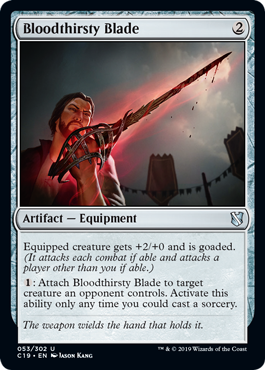
Bloodthirsty Blade
2
Artifact — Equipment
Equipped creature gets +2/+0 and is goaded. (It attacks each combat if able and attacks a player other than you if able.)
1: Attach Bloodthirsty Blade to target creature an opponent controls. Activate this ability only any time you could cast a sorcery.
- Bloodthirsty Blade has no equip ability. There's normally no way to have it attached to your own creature, although certain combinations of other cards make this possible.
- You still control Bloodthirsty Blade while it's equipped to an opponent's creature. You can move it any time you could cast a sorcery; the equipped creature's controller can't.
- If the equipped creature can't attack for any reason (such as being tapped or having come under that player's control that turn), then it doesn't attack. If there's a cost associated with having it attack, its controller isn't forced to pay that cost, so it doesn't have to attack in that case either.
- If the creature doesn't meet any of the above exceptions and can attack, it must attack a player other than Bloodthirsty Blade's controller if able. It the creature can't attack any of those players but could otherwise attack, it must attack an opposing planeswalker (controlled by any opponent) or the player who controls Bloodthirsty Blade.
- Attacking with a goaded creature doesn't cause it to stop being goaded. It remains goaded as long as it's equipped with Bloodthirsty Blade.
- If a creature you control has been goaded by multiple opponents, it must attack one of your opponents who hasn't goaded it, as that fulfills the maximum number of goad requirements. If a creature you control has been goaded by each of your opponents, you choose which opponent it attacks.
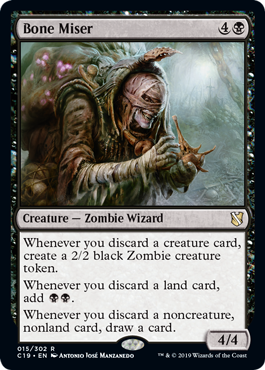
Bone Miser
4B
Creature — Zombie Wizard
4/4
Whenever you discard a creature card, create a 2/2 black Zombie creature token.
Whenever you discard a land card, add BB.
Whenever you discard a noncreature, nonland card, draw a card.
- Bone Miser's abilities are triggered abilities, not activated abilities. They don't allow you to discard a card whenever you want; rather, you need some other way of discarding a card.
- Bone Miser's second ability isn't a mana ability. It uses the stack and can be responded to. Notably, this means that you can't pay a cost of "2, Discard a card" by discarding a land card and using the BB produced to pay for the 2.
- If you discard a card as a cost to cast a spell or activate an ability, Bone Miser's triggered ability resolves before that spell or ability but after you've chosen targets for it. If you discard a card while a spell or ability is resolving, the triggered ability resolves after you've finished resolving that spell or ability.
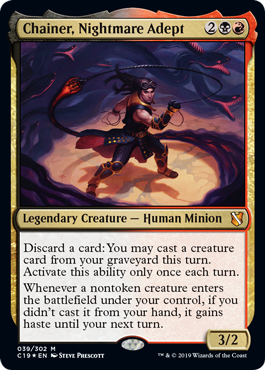
Chainer, Nightmare Adept
2BR
Legendary Creature — Human Minion
3/2
Discard a card: You may cast a creature card from your graveyard this turn. Activate this ability only once each turn.
Whenever a nontoken creature enters the battlefield under your control, if you didn't cast it from your hand, it gains haste until your next turn.
- You don't choose a creature card to cast while activating or resolving Chainer's first ability. The ability creates a permission for you to cast a creature card from your graveyard later in the turn.
- Chainer's first ability doesn't change when you can cast the creature card. You can normally only cast it during your turn while the stack is empty, but if the creature card has flash, you can cast it at other times.
- If you somehow activate Chainer's first ability more than once during a turn (perhaps because Chainer left the battlefield and returned), you can cast a creature card for each ability's permission. Similarly, if another effect allows you to cast a creature card from your graveyard, you may use that permission and later use Chainer's permission to cast another creature card.
- Chainer's last ability triggers if the entering creature was cast from a zone other than your hand, or if it wasn't cast at all and is entering the battlefield from anywhere (including from your hand).
- Chainer's last ability triggers if Chainer enters the battlefield without being cast from your hand.
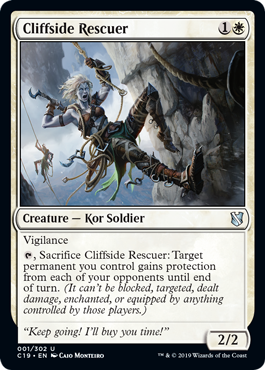
Cliffside Rescuer
1W
Creature — Kor Soldier
2/2
Vigilance
T, Sacrifice Cliffside Rescuer: Target permanent you control gains protection from each of your opponents until end of turn. (It can't be blocked, targeted, dealt damage, enchanted, or equipped by anything controlled by those players.)
- The players that the target permanent has protection from are determined as Cliffside Rescuer's ability resolves. If an opponent somehow gains control of that permanent later in the turn, it still has protection from your opponents, including its new controller.
- Protection from a player means that the permanent has protection from each object controlled by that player. If an object has no controller (such as a card in a graveyard), its owner is considered its controller for this purpose.
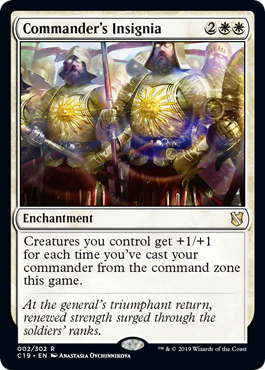
Commander's Insignia
2WW
Enchantment
Creatures you control get +1/+1 for each time you've cast your commander from the command zone this game.
- Commander's Insignia counts each time you've cast your commander, even the times it was countered or when your commander spell is still on the stack.
- Certain cards in other sets with the partner keyword may allow you to have more than one commander. If you do, Commander's Insignia counts the total number of times you've cast each of your commanders.
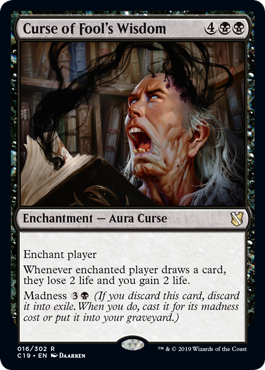
Curse of Fool's Wisdom
4BB
Enchantment — Aura Curse
Enchant player
Whenever enchanted player draws a card, they lose 2 life and you gain 2 life.
Madness 3B (If you discard this card, discard it into exile. When you do, cast it for its madness cost or put it into your graveyard.)
- If you become enchanted by your own Curse of Fool's Wisdom, you'll lose 2 life and gain 2 life whenever you draw a card. You won't lose the game if your life total is 0 or less between those events.
- Once the enchanted player has drawn one or more cards, they'll still lose life (and you'll still gain life) even if Curse of Fool's Wisdom leaves the battlefield before its triggered ability resolves.
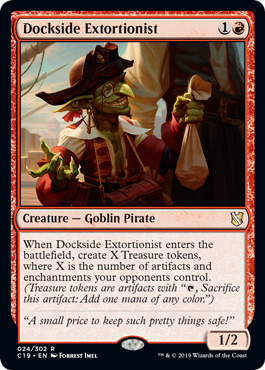
Dockside Extortionist
1R
Creature — Goblin Pirate
1/2
When Dockside Extortionist enters the battlefield, create X Treasure tokens, where X is the number of artifacts and enchantments your opponents control. (Treasure tokens are artifacts with "T, Sacrifice this artifact: Add one mana of any color.")
- If an opponent controls an artifact that's also an enchantment, that permanent is counted only once for Dockside Extortionist's ability.
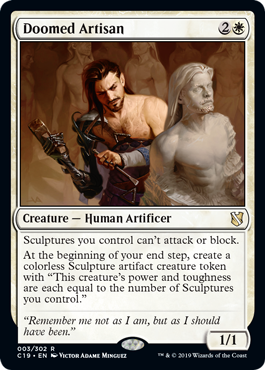
Doomed Artisan
2W
Creature — Human Artificer
1/1
Sculptures you control can't attack or block.
At the beginning of your end step, create a colorless Sculpture artifact creature token with "This creature's power and toughness are each equal to the number of Sculptures you control."
- A Sculpture token will count itself, so it'll be at least 1/1.
- Sculpture is a creature type, not an artifact type.
- Once Doomed Artisan has left the battlefield, your Sculptures can attack and block.
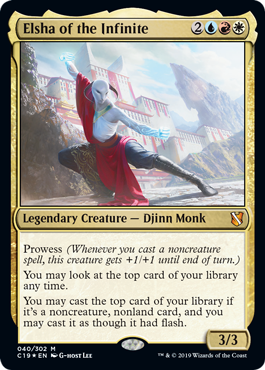
Elsha of the Infinite
2URW
Legendary Creature — Djinn Monk
3/3
Prowess (Whenever you cast a noncreature spell, this creature gets +1/+1 until end of turn.)
You may look at the top card of your library any time.
You may cast the top card of your library if it's a noncreature, nonland card, and you may cast it as though it had flash.
- Elsha lets you look at the top card of your library whenever you want (with one restriction—see below), even if you don't have priority. This action doesn't use the stack. Knowing what that card is becomes part of the information you have access to, just like you can look at the cards in your hand.
- If the top card of your library changes while you're casting a spell, playing a land, or activating an ability, you can't look at the new top card until you finish doing so. This means that if you cast the top card of your library, you can't look at the next one until you're done paying for that spell.
- You'll still pay all costs for a spell you cast from your library, including additional costs. You may also pay alternative costs.
- If another effect lets you cast the top card of your library, you may cast it as though it had flash even if it's a creature card.
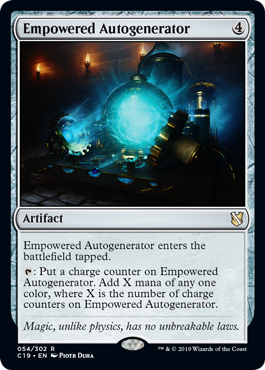
Empowered Autogenerator
4
Artifact
Empowered Autogenerator enters the battlefield tapped.
T: Put a charge counter on Empowered Autogenerator. Add X mana of any one color, where X is the number of charge counters on Empowered Autogenerator.
- Empowered Autogenerator's activated ability is a mana ability. It doesn't use the stack and can't be responded to.
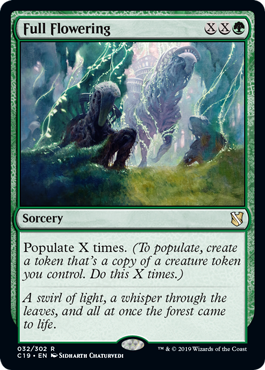
Full Flowering
XXG
Sorcery
Populate X times. (To populate, create a token that's a copy of a creature token you control. Do this X times.)
- The tokens enter the battlefield one at a time.
- Each time you populate, you can pick any creature token you control to copy. You don't have to create X tokens that are all copies of the same creature token.
- Any abilities that trigger while you're populating won't be put onto the stack until after you've finished populating X times.
- If X is 0, you don't populate at all.
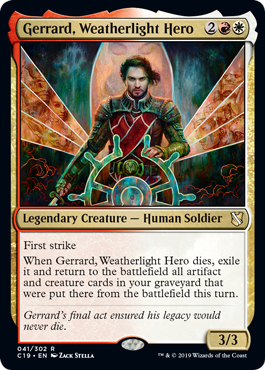
Gerrard, Weatherlight Hero
2RW
Legendary Creature — Human Soldier
3/3
First strike
When Gerrard, Weatherlight Hero dies, exile it and return to the battlefield all artifact and creature cards in your graveyard that were put there from the battlefield this turn.
- Gerrard's triggered ability returns artifact and creature cards even if Gerrard leaves your graveyard before you can exile it.
- Gerrard's triggered ability returns artifact and creature cards even if they were put into your graveyard while Gerrard wasn't on the battlefield, so long as they were put there this turn.
- If Gerrard is your commander, you can exile it into the command zone from your graveyard. You'll still return your artifact and creature cards.
- Permanent spells that were countered earlier in the turn never entered the battlefield, so they won't be returned by Gerrard's ability.
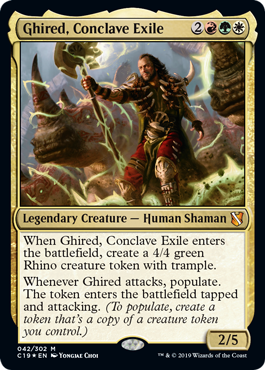
Ghired, Conclave Exile
2RGW
Legendary Creature — Human Shaman
2/5
When Ghired, Conclave Exile enters the battlefield, create a 4/4 green Rhino creature token with trample.
Whenever Ghired attacks, populate. The token enters the battlefield tapped and attacking. (To populate, create a token that's a copy of a creature token you control.)
- You choose which player or planeswalker the created token is attacking. It doesn't have to be attacking the same player or planeswalker that Ghired is attacking.
- Although the token is an attacking creature, it was never declared as an attacking creature. This means that abilities that trigger whenever a creature attacks won't trigger when it enters the battlefield attacking.
- Any effects that say that the token can't attack (such as that of Doomed Artisan, or if you copy a token with defender) affect only the declaration of attackers. They won't stop the token you populate from entering the battlefield attacking.
- In some rare cases, you might copy a creature token that isn't normally a creature. This token enters the battlefield as a noncreature permanent. It will be tapped but it won't be attacking.
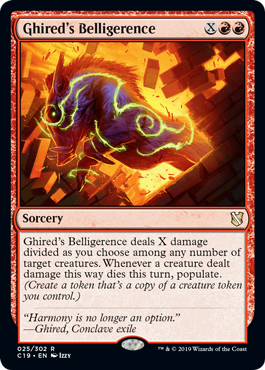
Ghired's Belligerence
XRR
Sorcery
Ghired's Belligerence deals X damage divided as you choose among any number of target creatures. Whenever a creature dealt damage this way dies this turn, populate. (Create a token that's a copy of a creature token you control.)
- You choose how the damage will be divided as you cast Ghired's Belligerence. Each target creature must be assigned at least 1 damage.
- If a target creature becomes an illegal target in response to Ghired's Belligerence, the damage that would have been dealt to that creature is lost. It can't be dealt instead to another legal target.
- The delayed triggered ability will trigger if a creature dealt damage by Ghired's Belligerence dies for any reason this turn, not just due to lethal damage.

Gift of Doom
4B
Enchantment — Aura
Enchant creature
Enchanted creature has deathtouch and indestructible.
Morph—Sacrifice another creature. (You may cast this card face down as a 2/2 creature for 3. Turn it face up any time for its morph cost.)
As Gift of Doom is turned face up, you may attach it to a creature.
- You can't pay Gift of Doom's morph cost more than once.
- No player may take any actions between the time you announce that you're turning Gift of Doom face up and the time it's attached to the chosen creature.
- If there's no creature you can legally attach Gift of Doom to as you turn it face up, or if you choose not to attach it to a creature, it's put into its owner's graveyard.
- This doesn't target the creature Gift of Doom will enchant, so an opponent's creature with hexproof or a creature with shroud may be chosen this way. The chosen recipient must be able to legally be enchanted by the Aura, so a creature with protection from black can't be chosen this way.
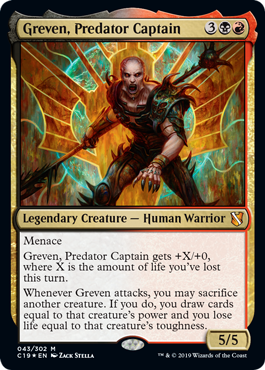
Greven, Predator Captain
3BR
Legendary Creature — Human Warrior
5/5
Menace
Greven, Predator Captain gets +X/+0, where X is the amount of life you've lost this turn.
Whenever Greven attacks, you may sacrifice another creature. If you do, you draw cards equal to that creature's power and you lose life equal to that creature's toughness.
- A player loses life if they're dealt damage or if they pay life.
- Greven checks for how much life you lost, not how much your life total has changed. If you lost 4 life but also gained 6 life, you still lost 4 life and Greven gets +4/+0.
- The sacrificed creature's power and toughness are determined by its last known information before it left the battlefield.
- You sacrifice a creature (or choose not to), draw cards, and lose life all while Greven's triggered ability is resolving. Nothing can happen in between, and no player may choose to take actions.
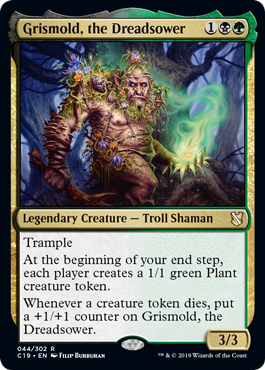
Grismold, the Dreadsower
1BG
Legendary Creature — Troll Shaman
3/3
Trample
At the beginning of your end step, each player creates a 1/1 green Plant creature token.
Whenever a creature token dies, put a +1/+1 counter on Grismold, the Dreadsower.
- Each Plant token is owned by the player who created it. You don't own them all.
- If Grismold is dealt lethal damage at the same time as a creature token, Grismold won't receive a counter from its ability in time to save it.
- In a multiplayer game, if a creature token dies at the same time its controller loses the game, Grismold's last ability triggers.
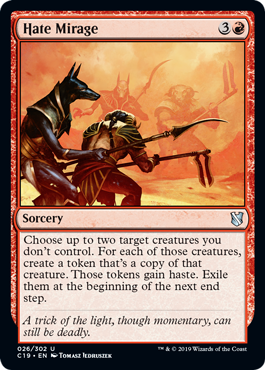
Hate Mirage
3R
Sorcery
Choose up to two target creatures you don't control. For each of those creatures, create a token that's a copy of that creature. Those tokens gain haste. Exile them at the beginning of the next end step.
- If one of the two target creatures become illegal, you create one token that's a copy of the one that's still a legal target. You don't create two tokens.
- Each token copies exactly what was printed on the original creature and nothing else (unless that creature is copying something else or is a token; see below). It doesn't copy whether that creature is tapped or untapped, whether it has any counters on it or Auras and Equipment attached to it, or any non-copy effects that have changed its power, toughness, types, color, or so on.
- Each token gains haste after it has been created. If something copies one of these tokens, the copy won't have haste, and you won't exile it at the beginning of the next end step.
- If the copied creature has X in its mana cost, X is considered to be 0.
- If the copied creature is a token, the token that's created copies the original characteristics of that token as stated by the effect that created the token.
- If the copied creature is copying something else (for example, if Volrath, the Shapestealer is having its own shape stolen by Hate Mirage), then the token enters the battlefield as whatever that creature copied.
- Any enters-the-battlefield abilities of the copied creature will trigger when the token enters the battlefield. Any "as [this creature] enters the battlefield" or "[this creature] enters the battlefield with" abilities of the creature will also work.
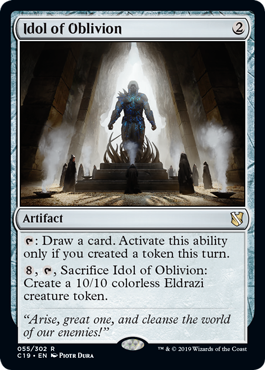
Idol of Oblivion
2
Artifact
T: Draw a card. Activate this ability only if you created a token this turn.
8, T, Sacrifice Idol of Oblivion: Create a 10/10 colorless Eldrazi creature token.
- You can activate Idol of Oblivion's first ability even if the token you've created was created before Idol of Oblivion entered the battlefield or if the token has left the battlefield.
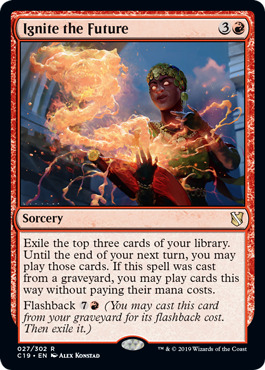
Ignite the Future
3R
Sorcery
Exile the top three cards of your library. Until the end of your next turn, you may play those cards. If this spell was cast from a graveyard, you may play cards this way without paying their mana costs.
Flashback 7R (You may cast this card from your graveyard for its flashback cost. Then exile it.)
- If you don't play some or all of the exiled cards, those cards remain in exile.
- Ignite the Future doesn't change when you can play the exiled cards. For example, if you exile a sorcery card, you can cast it only during your main phase when the stack is empty. If you exile a land card, you can play it only during your main phase and only if you have an available land play remaining.
- If you cast Ignite the Future from a zone other than a graveyard, you must pay the mana cost or an alternative cost for each spell cast this way. If you cast Ignite the Future from a graveyard, you may choose to cast each spell for its mana cost, an alternative cost, or without paying its mana cost.
- If a spell has X in its mana cost, you must choose 0 as the value of X when casting it without paying its mana cost.
- If you cast a card "without paying its mana cost," you can't choose to cast it for any alternative costs and not pay that cost. You can, however, pay additional costs. If the card has any mandatory additional costs, such as that of Momentous Fall, you must pay those to cast the card.
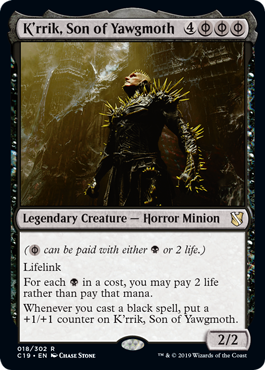
- K'rrik, Son of Yawgmoth
4b/pb/pb/p
Legendary Creature — Horror Minion
2/2
(b/p can be paid with either B or 2 life.)
Lifelink
For each B in a cost, you may pay 2 life rather than pay that mana.
Whenever you cast a black spell, put a +1/+1 counter on K'rrik, Son of Yawgmoth. - K'rrik's ability doesn't modify or reduce costs you pay. It changes only how you may pay those costs.
- You can't pay 2 life to pay for generic mana in costs you pay, even if an effect says that you must spend black mana to pay that generic mana.
- If a cost contains a mana symbol that may be paid in multiple ways, such as b/r, b/p, or 2/b, you choose how you'll pay it before you do so. If you choose to pay B this way, K'rrik's ability allows you to pay life rather than pay that mana.
- K'rrik's ability lets you pay 2 life for B in any cost you pay, including casting costs, activation costs, and even costs for special actions (such as morph). Any time you pay mana, that's a cost.
- K'rrik's last ability resolves before the spell that caused it to trigger. It resolves even if that spell is countered.
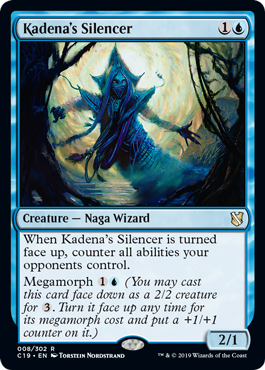
Kadena's Silencer
1U
Creature — Naga Wizard
2/1
When Kadena's Silencer is turned face up, counter all abilities your opponents control.
Megamorph 1U (You may cast this card face down as a 2/2 creature for 3. Turn it face up any time for its megamorph cost and put a +1/+1 counter on it.)
- Kadena's Silencer counters only activated and triggered abilities already on the stack. It doesn't prevent abilities from being activated or from triggering later in the turn, and it has no effect on static abilities.
- Kadena's Silencer can't counter an activated or triggered mana ability. An activated mana ability is one that adds mana to a player's mana pool as it resolves, doesn't have a target, and isn't a loyalty ability. A triggered mana ability is one that adds mana to a player's mana pool and triggers on an activated mana ability.
- Activated abilities are written in the form "[Cost]: [Effect]." Some keyword abilities (such as equip) are activated abilities and will have colons in their reminder texts. Notably, turning a creature face up is not an activated ability.
- Triggered abilities use the word "when," "whenever," or "at." They're often written as "[Trigger condition], [effect]." Some keyword abilities (such as madness's ability to cast the exiled card) are triggered abilities and will have "when," "whenever," or "at" in their reminder text.
- Abilities that create replacement effects, such as a permanent entering the battlefield tapped or with counters on it, can't be countered. Abilities that apply "as [this creature] enters the battlefield" are also replacement effects and can't be countered.
- If you counter a delayed triggered ability that triggered at the beginning of the "next" occurrence of a specified step or phase, that ability won't trigger again the following time that phase or step occurs.
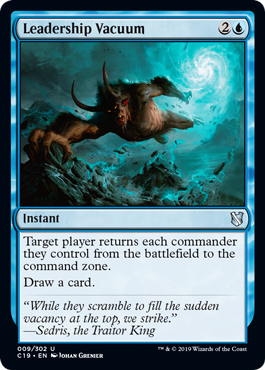
Leadership Vacuum
2U
Instant
Target player returns each commander they control from the battlefield to the command zone.
Draw a card.
- Leadership Vacuum targets the player, not their creatures. A commander with hexproof or protection from blue may be returned this way.
- You'll draw a card even if the target player controls no commanders as Leadership Vacuum resolves.
- The "commander tax" increases based on how many times a commander was cast from the command zone, not how many times it was put there instead of being put into another zone. The returned commander will cost more to cast again even though it was put directly into the command zone.
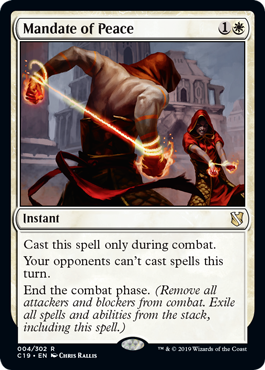
Mandate of Peace
1W
Instant
Cast this spell only during combat.
Your opponents can't cast spells this turn.
End the combat phase. (Remove all attackers and blockers from combat. Exile all spells and abilities from the stack, including this spell.)
- If an effect allows or instructs you to cast Mandate of Peace outside of a combat phase, you can't do so. Its restriction takes precedence over that permission. Similarly, once Mandate of Peace has resolved, your opponents can't cast spells even if another effect allows or instructs one of them to cast a spell.
- Mandate of Peace doesn't stop any player from casting spells in response to Mandate of Peace before it resolves.
- Your opponents can still activate abilities, including abilities of cards in their hand (such as cycling abilities), and can still play lands.
- Ending the combat phase this way means the following things happen in order: 1) All spells and abilities on the stack are exiled. This includes spells and abilities that can't be countered. 2) State-based actions are checked. No player gets priority, and no triggered abilities are put onto the stack. 3) The current phase and step ends. The game skips straight to the postcombat main phase. As this happens, all attacking and blocking creatures are removed from combat and effects that last "until end of combat" expire.
- In the rare case that the postcombat main phase is skipped, the game skips to the end step of the ending phase. If that step is also skipped, the game skips straight to the turn's cleanup step. The cleanup step can't be skipped.
- If any triggered abilities trigger during this process, they're put onto the stack after the game skips to the appropriate phase or step.
- Any "at end of combat" triggered abilities won't get the chance to trigger that combat because the end of combat step is skipped.
- Though other spells and abilities that are exiled won't get a chance to resolve, they don't count as being countered.
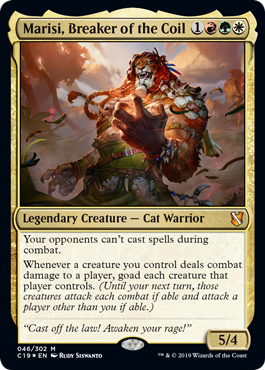
Marisi, Breaker of the Coil
1RGW
Legendary Creature — Cat Warrior
5/4
Your opponents can't cast spells during combat.
Whenever a creature you control deals combat damage to a player, goad each creature that player controls. (Until your next turn, those creatures attack each combat if able and attack a player other than you if able.)
- If an effect allows or instructs an opponent to cast a spell during a combat phase, they can't do so. Marisi's restriction takes precedence over that permission.
- Opponents can still activate abilities during combat.
- Creatures that enter the battlefield after Marisi's second ability resolves won't be goaded.
- The goaded creatures remain goaded even if Marisi leaves the battlefield before your next turn.
- If a goaded creature can't attack for any reason (such as being tapped or having come under that player's control that turn), then it doesn't attack. If there's a cost associated with having it attack, its controller isn't forced to pay that cost, so it doesn't have to attack in that case either.
- If the creature doesn't meet any of the above exceptions and can attack, it must attack a player other than the controller of the ability that goaded it if able. It the creature can't attack any of those players but could otherwise attack, it must attack an opposing planeswalker (controlled by any opponent) or the player who goaded it.
- Attacking with a goaded creature doesn't cause it to stop being goaded. If there is an additional combat phase that turn, or if another player gains control of that creature before it stops being goaded, it must attack again if able and continue to follow any restrictions.
- If a creature you control has been goaded by multiple opponents, it must attack one of your opponents who hasn't goaded it, as that fulfills the maximum number of goad requirements. If a creature you control has been goaded by each of your opponents, you choose which opponent it attacks.
- In a multiplayer game, if you leave the game after Marisi's second ability resolves but before your next turn begins, its effect lasts until your next turn would have begun. It neither expires immediately nor lasts indefinitely.

Mass Diminish
1U
Sorcery
Until your next turn, creatures target player controls have base power and toughness 1/1.
Flashback 3U (You may cast this card from your graveyard for its flashback cost. Then exile it.)
- Mass Diminish overwrites all previous effects that set a creature's base power and toughness to specific values. Any power- or toughness-setting effects that start to apply after that ability resolves will overwrite this effect.
- Effects that raise or lower a creature's power and/or toughness, such as the effect of Titanic Growth, will apply to that creature no matter when they started to take effect. The same is true for any counters that change its power and/or toughness.
- Mass Diminish targets the player, not their creatures. A creature with hexproof or protection from blue may be shrunk this way.
- Mass Diminish affects only creatures the target player controls at the time it resolves. Creatures they begin to control later before your next turn won't be 1/1.
- Because damage remains marked on a creature until it's removed as the turn ends, nonlethal damage dealt to a creature the target player controls may become lethal once its base toughness becomes 1.
- In a multiplayer game, if you leave the game after Mass Diminish resolves but before your next turn begins, its effect lasts until your next turn would have begun. It neither expires immediately nor lasts indefinitely.
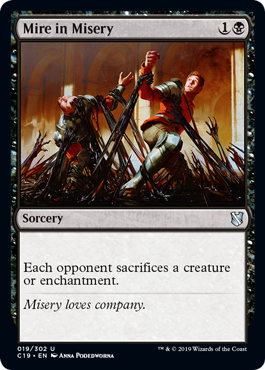
Mire in Misery
1B
Sorcery
Each opponent sacrifices a creature or enchantment.
- As Mire in Misery resolves, first the next opponent in turn order (or, if it's an opponent's turn, the opponent whose turn it is) chooses a creature or an enchantment they control, then each other opponent in turn order does the same, knowing the choices made before them. Then all the chosen permanents are sacrificed at the same time.
- Your opponents choose what to sacrifice from among the creatures and enchantments they control. This means that you don't decide which type of permanent a player sacrifices, and a player can't choose to sacrifice an enchantment if they control none.
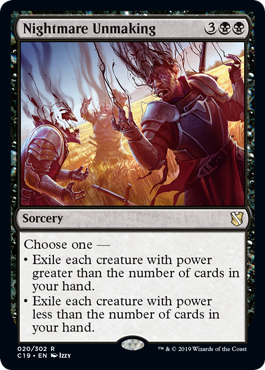
Nightmare Unmaking
3BB
Sorcery
Choose one —
• Exile each creature with power greater than the number of cards in your hand.
• Exile each creature with power less than the number of cards in your hand.
- Because Nightmare Unmaking is on the stack while it's resolving, it won't be counted among the cards in your hand.
- The power of creatures and the number of cards in your hand are checked only as Nightmare Unmaking resolves. Players may respond to the spell knowing the chosen mode to try to save or doom a creature.
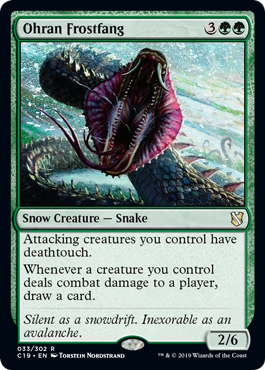
Ohran Frostfang
3GG
Snow Creature — Snake
2/6
Attacking creatures you control have deathtouch.
Whenever a creature you control deals combat damage to a player, draw a card.
- Snow is a supertype, not a card type. It has no rules meaning or function by itself, but other cards and abilities may refer to it.
- If one or more creatures you control deal combat damage to players at the same time that lethal damage is dealt to Ohran Frostfang, its ability triggers for each of those creatures.
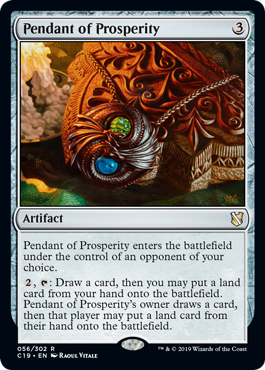
Pendant of Prosperity
3
Artifact
Pendant of Prosperity enters the battlefield under the control of an opponent of your choice.
2, T: Draw a card, then you may put a land card from your hand onto the battlefield. Pendant of Prosperity's owner draws a card, then that player may put a land card from their hand onto the battlefield.
- Pendant of Prosperity's effect doesn't count as playing a land. It can put a land card onto the battlefield even if you've already played your land for the turn, and even if it's not your turn.
- If you control your own Pendant of Prosperity and activate its last ability, you'll draw a card, then you may put a land card onto the battlefield, then you'll draw a second card, then you may once again put a land card onto the battlefield.
- In a multiplayer game, if Pendant of Prosperity's owner leaves the game, Pendant of Prosperity leaves the game with them. If Pendant of Prosperity's controller leaves the game, Pendant of Prosperity is exiled (assuming that player wasn't also Pendant of Prosperity's owner).
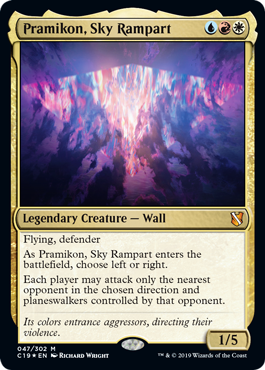
Pramikon, Sky Rampart
URW
Legendary Creature — Wall
1/5
Flying, defender
As Pramikon, Sky Rampart enters the battlefield, choose left or right.
Each player may attack only the nearest opponent in the chosen direction and planeswalkers controlled by that opponent.
- If two Pramikons on the battlefield disagree on which direction players must attack, players can't attack at all.
- If no choice was made for Pramikon (perhaps because it's actually Volrath, the Shapestealer in an impressively clever disguise), its last ability has no effect.
- In a multiplayer game, players may use any mutually agreeable method to determine seating order after they've chosen decks but before the game begins. If players can't agree (perhaps because Pramikon has them worried about who their nearest opponent is), players should be seated randomly.
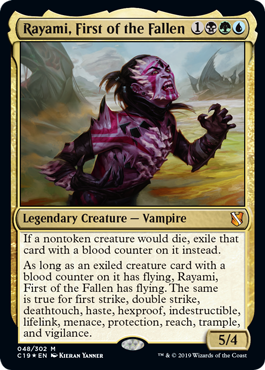
Rayami, First of the Fallen
1BGU
Legendary Creature — Vampire
5/4
If a nontoken creature would die, exile that card with a blood counter on it instead.
As long as an exiled creature card with a blood counter on it has flying, Rayami, First of the Fallen has flying. The same is true for first strike, double strike, deathtouch, haste, hexproof, indestructible, lifelink, menace, protection, reach, trample, and vigilance.
- Rayami looks at all exiled creature cards with blood counters, not only those exiled with its ability. It even looks at those exiled by an ability of another player's Rayami, First of the Fallen.
- If a nontoken creature that isn't normally a creature (such as a Vehicle) would die, Rayami exiles it with a blood counter on it, although Rayami won't gain any of its abilities.
- If an exiled creature card has one or more variants of the listed keywords (for example, protection from black or hexproof from white), Rayami gains those specific variants.
- If an exiled creature card has one of the listed keywords only if certain conditions are met, the ability granting that keyword doesn't apply while the card is in exile. Rayami won't gain that ability from that card.
- Nontoken creatures that would die at the same time that Rayami leaves the battlefield are exiled with blood counters.
- If multiple replacement effects try to change where a dying creature would go, the controller of the creature chooses one to apply. If Rayami's effect doesn't exile the creature, it won't have a blood counter on it, even if another effect exiles it. Keep in mind that the effect that allows a player to spare their commander from death is a replacement effect.
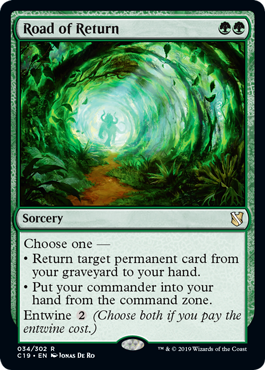
Road of Return
GG
Sorcery
Choose one —
• Return target permanent card from your graveyard to your hand.
• Put your commander into your hand from the command zone.
Entwine 2 (Choose both if you pay the entwine cost.)
- The "commander tax" increases based on how many times a commander was cast from the command zone. Casting a commander from your hand doesn't require that additional cost, and it doesn't increase what the cost will be the next time you cast that commander from the command zone.
- If your commander isn't in the command zone (or if you're not playing the Commander variant), Road of Return's second mode does nothing.
- Certain cards in other sets with the partner keyword may allow you to have more than one commander. If you have two commanders in the command zone, Road of Return's second mode puts one of your choice into your hand, not both.
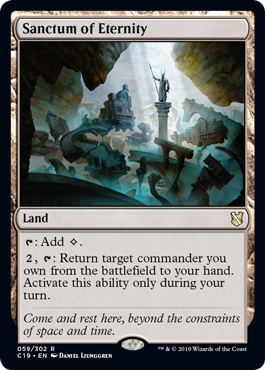
Sanctum of Eternity
Land
T: Add C.
2, T: Return target commander you own from the battlefield to your hand. Activate this ability only during your turn.
- The "commander tax" increases based on how many times a commander was cast from the command zone. Casting a commander from your hand doesn't require that additional cost, and it doesn't increase what the cost will be the next time you cast that commander from the command zone.
- If your commander isn't on the battlefield (or if you're not playing the Commander variant), Sanctum of Eternity's second ability does nothing.
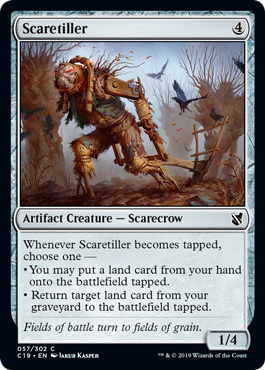
Scaretiller
4
Artifact Creature — Scarecrow
1/4
Whenever Scaretiller becomes tapped, choose one —
• You may put a land card from your hand onto the battlefield tapped.
• Return target land card from your graveyard to the battlefield tapped.
- Scaretiller's ability is a triggered ability, not an activated ability. It doesn't allow you to tap it whenever you want; rather, you need some other way of tapping it, such as by attacking.
- If Scaretiller becomes tapped while casting a spell or activating an ability, that spell or ability resolves after Scaretiller's triggered ability has resolved.
- Neither mode of Scaretiller's ability counts as playing a land. It can put a land card onto the battlefield even if you've already played your land for the turn, and even if it's not your turn.
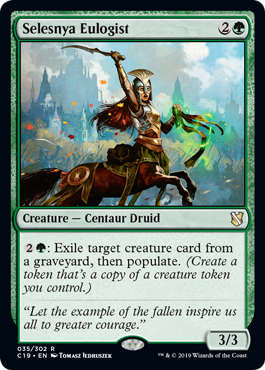
Selesnya Eulogist
2G
Creature — Centaur Druid
3/3
2G: Exile target creature card from a graveyard, then populate. (Create a token that's a copy of a creature token you control.)
- You can't activate Selesnya Eulogist's ability without a target creature card in a graveyard.
- If the target card is an illegal target by the time Selesnya Eulogist's ability tries to resolve, the ability doesn't resolve. You won't populate.
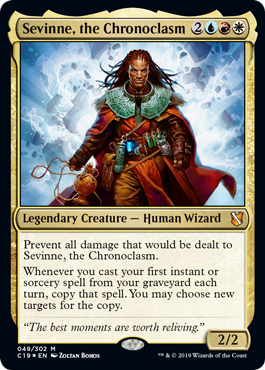
Sevinne, the Chronoclasm
2URW
Legendary Creature — Human Wizard
2/2
Prevent all damage that would be dealt to Sevinne, the Chronoclasm.
Whenever you cast your first instant or sorcery spell from your graveyard each turn, copy that spell. You may choose new targets for the copy.
- If you cast an instant or sorcery spell from your graveyard before Sevinne enters the battlefield during the same turn, its last ability can't trigger that turn.
- Sevinne's ability will copy any instant or sorcery spell, not just one with targets.
- A copy is created even if the spell that caused Sevinne's ability to trigger has been countered by the time that ability resolves. The copy resolves before the original spell.
- The copy will have the same targets as the spell it's copying unless you choose new ones. You may change any number of the targets, including all of them or none of them. The new targets must be legal.
- If the spell that's copied is modal (that is, it says "Choose one —" or the like), the copy will have the same mode or modes. You can't choose different ones.
- If the spell that's copied has an X whose value was determined as it was cast, the copy has the same value of X.
- You can't choose to pay any additional costs for the copy. However, effects based on any additional costs that were paid for the original spell are copied as though those same costs were paid for the copy too.
- The copy that Sevinne's ability creates is created on the stack, so it's not "cast." Abilities that trigger when a player casts a spell won't trigger. Any of that spell's effects that apply only if it was cast from a graveyard won't apply.
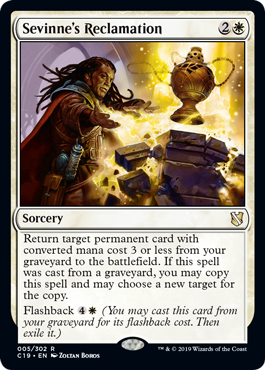
Sevinne's Reclamation
2W
Sorcery
Return target permanent card with converted mana cost 3 or less from your graveyard to the battlefield. If this spell was cast from a graveyard, you may copy this spell and may choose a new target for the copy.
Flashback 4W (You may cast this card from your graveyard for its flashback cost. Then exile it.)
- A permanent card is an artifact, creature, enchantment, land, or planeswalker card.
- If a card in a graveyard has X in its mana cost, X is considered to be 0.
- If the target card is an illegal target by the time Sevinne's Reclamation tries to resolve, the spell doesn't resolve. You won't copy it if you cast it from a graveyard.
- The copy that Sevinne's Reclamation creates is created on the stack, so it's not "cast." Abilities that trigger when a player casts a spell won't trigger. The copy wasn't cast from a graveyard, so it won't make another copy of itself.
- If you cast Sevinne's Reclamation from your graveyard, any abilities that trigger as the permanent card returns to the battlefield will resolve before the copy of Sevinne's Reclamation resolves but after new targets for the copy have been chosen.
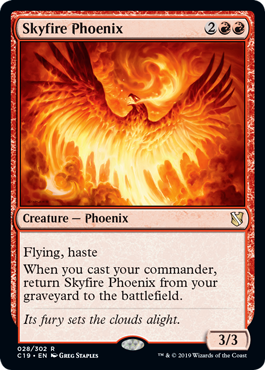
Skyfire Phoenix
2RR
Creature — Phoenix
3/3
Flying, haste
When you cast your commander, return Skyfire Phoenix from your graveyard to the battlefield.
- Skyfire Phoenix's triggered ability resolves before the commander spell that caused the ability to trigger. The ability resolves even if that commander spell is countered.

Song of the Worldsoul
4WW
Enchantment
Whenever you cast a spell, populate. (Create a token that's a copy of a creature token you control.)
- Song of the Worldsoul's ability will resolve before the spell that caused it to trigger but after targets have been chosen for that spell. It resolves even if that spell is countered.
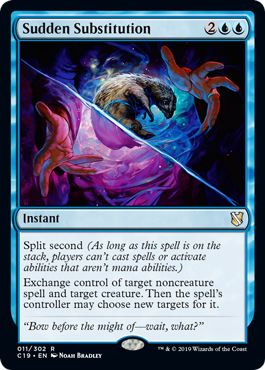
Sudden Substitution
2UU
Instant
Split second (As long as this spell is on the stack, players can't cast spells or activate abilities that aren't mana abilities.)
Exchange control of target noncreature spell and target creature. Then the spell's controller may choose new targets for it.
- While a spell with split second is on the stack, players can take special actions such as turning a face-down permanent face up.
- A mana ability is an ability that produces mana, not an ability that costs mana.
- If the target spell or the target creature is an illegal target as Sudden Substitution resolves, the exchange won't happen. If both targets are legal but are both controlled by the same player, the exchange won't happen.
- If the exchange doesn't happen but the spell is still a legal target, its controller may choose new targets for it.
- The noncreature spell is still on the stack after exchanging control, and the creature is still on the battlefield.
- If a permanent spell is exchanged this way, its new controller will control the permanent it becomes.
- The exchange lasts indefinitely. It doesn't expire if the spell or the creature changes zones or leaves the game.
- In a multiplayer game, if the controller of one of the objects leaves the game after Sudden Substitution resolves, the effect that gave them control of the spell or permanent expires. If the spell is still on the stack, the player who gains control of it this way can’t choose new targets for it.
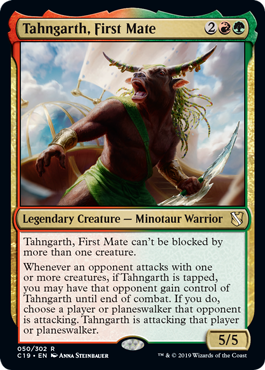
Tahngarth, First Mate
2RG
Legendary Creature — Minotaur Warrior
5/5
Tahngarth, First Mate can't be blocked by more than one creature.
Whenever an opponent attacks with one or more creatures, if Tahngarth is tapped, you may have that opponent gain control of Tahngarth until end of combat. If you do, choose a player or planeswalker that opponent is attacking. Tahngarth is attacking that player or planeswalker.
- If Tahngarth gains menace, it can't be blocked at all.
- Giving control of Tahngarth to an opponent doesn't cause it to become untapped. This means that Tahngarth may end up attacking several times between your turns.
- If an opponent is attacking a planeswalker but not that planeswalker's controller, Tahngarth can't attack that player.
- If an opponent attacks a player or planeswalker but each creature attacking that player or planeswalker is no longer attacking that player or planeswalker by the time Tahngarth's ability resolves (most likely because they've left the battlefield), that player or planeswalker can't be chosen for Tahngarth to attack. If there's no player or planeswalker to choose this way but you still choose to give the opponent control of Tahngarth, Tahngarth isn't attacking.
- Players can't take any actions between the time you choose to give control of Tahngarth to the attacking player and the time it becomes an attacking creature.
- Although Tahngarth is an attacking creature if it uses its triggered ability, it was never declared as an attacking creature. This means that abilities that trigger whenever a creature attacks won't trigger when it changes control and becomes attacking.
- Any effects that say that Tahngarth can't attack or can't attack a certain player (such as that of Propaganda, or if Tahngarth gains defender) affect only the declaration of attackers. They won't stop Tahngarth from becoming an attacking creature through its triggered ability.
- Tahngarth may end up attacking its owner this way.
- Commander damage is tracked for each commander. It doesn’t matter who controls the commander as it deals damage. If Tahngarth deals 10 damage to one player while under your control and another 11 damage to that same player while under a third player’s control, the player loses the game.
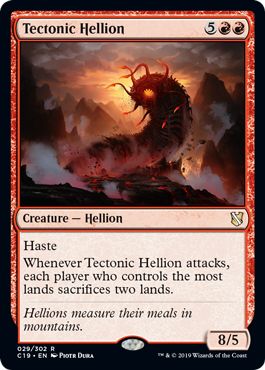
Tectonic Hellion
5RR
Creature — Hellion
8/5
Haste
Whenever Tectonic Hellion attacks, each player who controls the most lands sacrifices two lands.
- The player or players who will sacrifice lands is determined only as Tectonic Hellion's triggered ability begins to resolve.
- If more than one player controls the most lands, each of those players sacrifices two lands. If everyone controls the same number of lands, everyone sacrifices two lands.
- If more than one player will sacrifice lands as Tectonic Hellion's triggered ability resolves, first the player whose turn it is chooses two lands they control (if they control the most lands), then each other player in turn order does the same if they control the most lands, knowing the choices made before them. Then all the chosen lands are sacrificed at the same time.
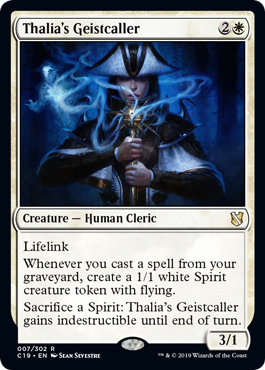
Thalia's Geistcaller
2W
Creature — Human Cleric
3/1
Lifelink
Whenever you cast a spell from your graveyard, create a 1/1 white Spirit creature token with flying.
Sacrifice a Spirit: Thalia's Geistcaller gains indestructible until end of turn.
- The triggered ability of Thalia's Geistcaller will resolve before the spell that caused it to trigger but after targets have been chosen for that spell. It resolves even if that spell is countered.
- You can sacrifice any Spirit you control to activate the last ability of Thalia's Geistcaller, not just a Spirit token it created.

Thieving Amalgam
5BB
Creature — Ape Snake
6/7
At the beginning of each opponent's upkeep, you manifest the top card of that player's library. (Put it onto the battlefield face down as a 2/2 creature. Turn it face up any time for its mana cost if it's a creature card.)
Whenever a creature you control but don't own dies, its owner loses 2 life and you gain 2 life.
- Your opponents can't look at the card they own that you manifested.
- If a creature you control but don't own dies at the same time that your life total becomes 0 or less, you lose the game before Thieving Amalgam's last ability can save you.
- If a creature you control but don't own dies at the same time that its owner leaves the game, Thieving Amalgam's last ability triggers. No player loses 2 life, but you gain 2 life.
- In the Commander variant, you can produce mana that isn't of your commander's color identity if an effect lets you produce mana of that color or mana of any color, even though those symbols can't appear on cards in your deck. You may be able to turn a manifested creature card face up this way if it's not the same colors as your commander.
- In a multiplayer game, if a player leaves the game, all cards that player owns leave as well. If you leave the game, the creatures you manifested with Thieving Amalgam's triggered ability are exiled.
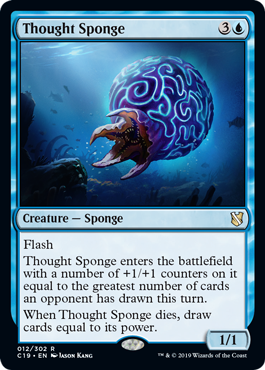
Thought Sponge
3U
Creature — Sponge
1/1
Flash
Thought Sponge enters the battlefield with a number of +1/+1 counters on it equal to the greatest number of cards an opponent has drawn this turn.
When Thought Sponge dies, draw cards equal to its power.
- Thought Sponge checks how many cards were drawn by opponents this turn, even opponents who have left the game. The greatest number drawn by a single opponent is how many +1/+1 counters it enters with.
- Thought Sponge checks the total number of cards drawn by each opponent, not how many were drawn due to a single instruction.
- Use Thought Sponge's power as it last existed on the battlefield to determine how many cards to draw for its last ability. If that number is negative, you neither draw nor discard cards.
- Thought Sponge gets its +1/+1 counters at the moment it enters the battlefield. There's not a time that it's on the battlefield before its replacement effect has applied.
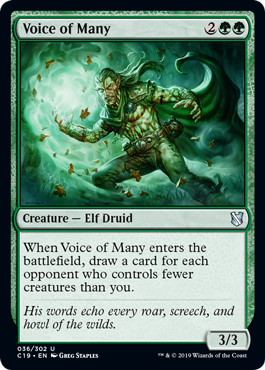
Voice of Many
2GG
Creature — Elf Druid
3/3
When Voice of Many enters the battlefield, draw a card for each opponent who controls fewer creatures than you.
- Opponents who have left the game aren't counted.
- You compare how many creatures opponents control only as Voice of Many's triggered ability resolves. If it's still on the battlefield, it'll count among the creatures you control.
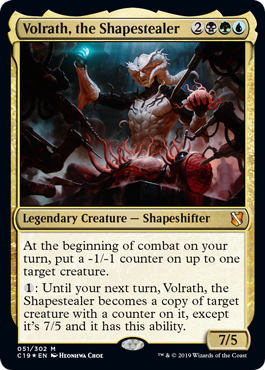
Volrath, the Shapestealer
2BGU
Legendary Creature — Shapeshifter
7/5
At the beginning of combat on your turn, put a -1/-1 counter on up to one target creature.
1: Until your next turn, Volrath, the Shapestealer becomes a copy of target creature with a counter on it, except it's 7/5 and it has this ability.
- Activating Volrath's last ability causes it to lose its first ability until your next turn, so if you activate it before the beginning of combat step, it won't trigger during that turn. Players can cast instant spells and activate abilities (such as the second ability) during the beginning of combat step after that first ability has triggered or resolved but before attackers are chosen in the declare attackers step.
- If a creature has +1/+1 counters and -1/-1 counters on it, state-based actions remove the same number of each so that it has only one of those kinds of counters on it. This may cause the creature to no longer have any counters on it.
- Volrath copies the printed values of the target creature, plus any copy effects that have been applied to it. It won't copy counters on that creature. It also won't copy any effects that have changed its power, toughness, types, color, or so on. Notably, it won't copy effects that made the target become a creature if it's not normally a creature.
- If Volrath becomes a copy of a card that is manifested, Volrath becomes a 7/5 creature with no color, cost, or creature type. Volrath is still face up.
- If Volrath copies a creature that's copying something else, it will become whatever the target is copying.
- If the target creature is a token, Volrath copies the original characteristics of that token as stated by the effect that created the token. Volrath doesn't become a token in this case.
- If an effect begins to apply to Volrath before it becomes a copy of another creature, that effect will continue to apply.
- If Volrath copies a creature the same turn Volrath enters the battlefield, you can't attack with it or use any of its T abilities (if it gains any) unless the copied creature has haste.
- If Volrath becomes a copy of a legendary creature you control, you'll put one of them into your graveyard.
- If another object becomes a copy of Volrath, it has the ability to become a copy of something else and it's 7/5.
- If Volrath becomes a copy of a creature whose power and toughness are defined by an ability (usually printed as */* or similar), Volrath doesn't copy the ability that defines its power and toughness. Volrath remains a 7/5 creature.
- If Volrath copies a creature with an ability that can be activated only once each turn (such as Chainer, Nightmare Adept), you can activate that ability once. If Volrath then becomes a copy of that same creature, you can activate that ability another time, and so on.
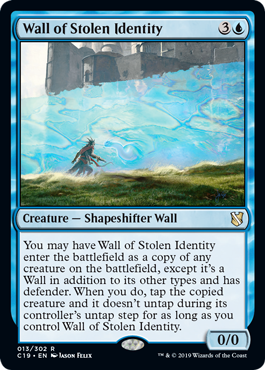
Wall of Stolen Identity
3U
Creature — Shapeshifter Wall
0/0
You may have Wall of Stolen Identity enter the battlefield as a copy of any creature on the battlefield, except it's a Wall in addition to its other types and has defender. When you do, tap the copied creature and it doesn't untap during its controller's untap step for as long as you control Wall of Stolen Identity.
- Wall of Stolen Identity copies exactly what was printed on the original creature (unless that creature is copying something else or is a token; see below). It doesn't copy whether that creature is tapped or untapped, whether it has any counters on it or any Auras and Equipment attached to it, or any non-copy effects that have changed its power, toughness, types, color, or so on.
- If Wall of Stolen Identity copies a creature that's normally not a creature (such as Mutavault), the copied permanent will be tapped and will remain tapped even when it's no longer a creature for as long as you control Wall of Stolen Identity.
- If the copied creature has X in its mana cost, X is considered to be 0.
- If the chosen creature is copying something else (for example, if the chosen creature is another Wall of Stolen Identity), then Wall of Stolen Identity enters the battlefield as whatever the chosen creature copied.
- If the chosen creature is a token, Wall of Stolen Identity copies the original characteristics of that token as stated by the effect that created the token. Wall of Stolen Identity doesn't become a token in this case.
- Any enters-the-battlefield abilities of the copied creature will trigger when Wall of Stolen Identity enters the battlefield. Any "as [this creature] enters the battlefield" or "[this creature] enters the battlefield with" abilities of the chosen creature will also work.
- If Wall of Stolen Identity somehow enters the battlefield at the same time as another creature, it can't become a copy of that creature. You may choose only a creature that's already on the battlefield.
- Once Wall of Stolen Identity has entered the battlefield and stolen a creature's identity, players can take actions before the creature is tapped.
- If another player gains control of Wall of Stolen Identity, its effect keeping the creature tapped expires. It won't keep the creature from untapping anymore, even if you later regain control of Wall of Stolen Identity.
- Wall of Stolen Identity can copy a tapped creature. That creature just remains tapped and doesn't untap during its controller's next untap step for as long as you control Wall of Stolen Identity.
- If Wall of Stolen Identity leaves the battlefield before its triggered ability has resolved, the copied creature will be tapped, but it will untap as normal.
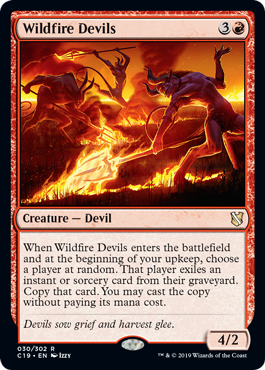
Wildfire Devils
3R
Creature — Devil
4/2
When Wildfire Devils enters the battlefield and at the beginning of your upkeep, choose a player at random. That player exiles an instant or sorcery card from their graveyard. Copy that card. You may cast the copy without paying its mana cost.
- You choose a player at random and they exile a card all while the triggered ability is resolving. No player may take any actions between the two or between exiling the card and you copying and casting it.
- The chosen player chooses which card to exile from their graveyard.
- If the chosen player has no instant or sorcery cards in their graveyard, Wildfire Devils's ability does nothing. You don't pick a different player.
- The copy of the card is created in exile and cast from exile, not from a graveyard.
- You can cast the copy only as the triggered ability resolves. If you don't want to cast it at that time (or you can't cast it, perhaps because there are no legal targets available), the copy ceases to exist. You can't cast it later.
- You can cast the copy during the resolution of the triggered ability if it's a sorcery, no matter whose turn it is or which phase it is.
- If a spell has X in its mana cost, you must choose 0 as the value of X when casting it without paying its mana cost.
- If you cast a card "without paying its mana cost," you can't choose to cast it for any alternative costs. You can, however, pay additional costs. If the card has any mandatory additional costs, such as that of Momentous Fall, you must pay those to cast the card.
Magic: The Gathering, Magic: The Gathering—Commander, and Magic are trademarks of Wizards of the Coast LLC in the USA and other countries. ©2019 Wizards.
